
Evolutionary Psychological Science
Scope & Guideline
Charting New Territories in Psychological Science.
Introduction
Aims and Scopes
- Evolutionary Psychology Framework:
The journal primarily employs an evolutionary psychology framework to analyze human behavior, emphasizing the adaptive significance of psychological traits and social behaviors in ancestral environments. - Interdisciplinary Approaches:
Research published in this journal often integrates insights from various disciplines, including biology, anthropology, and sociology, creating a multidisciplinary approach to understanding human behavior. - Focus on Mate Choice and Sexual Strategies:
A consistent theme in the journal is the exploration of mate choice, sexual strategies, and reproductive behaviors, examining how these elements have evolved and their implications for contemporary society. - Impact of Environmental Factors:
The journal often considers how environmental pressures, such as ecological harshness or social dynamics, shape psychological traits, preferences, and behaviors, indicating a strong interest in the interplay between environment and evolution. - Health and Disease Avoidance:
Research addressing health-related behaviors and disease avoidance mechanisms is prevalent, highlighting the evolutionary underpinnings of these responses in shaping human social interactions and preferences.
Trending and Emerging
- Psychopathology and Evolution:
An increasing number of studies are exploring the evolutionary underpinnings of psychopathology, linking mental health issues to evolutionary processes and adaptive responses to environmental challenges. - Digital and Social Media Influences:
Research examining the impact of digital environments and social media on human behavior is on the rise, reflecting contemporary concerns about how these platforms shape social interactions and psychological processes. - Health Psychology and Disease Avoidance:
There is a growing emphasis on health psychology, particularly regarding disease avoidance behaviors and their evolutionary significance, especially in light of global health crises such as the COVID-19 pandemic. - Cultural Evolution and Adaptation:
Research that investigates cultural evolution and the adaptive significance of cultural practices is increasingly prevalent, highlighting the interplay between biological evolution and cultural change. - Interpersonal Relationships and Social Dynamics:
Studies focusing on interpersonal relationships, including friendship dynamics, romantic relationships, and social competition, are emerging as significant areas of interest, reflecting a broader understanding of social behavior through an evolutionary lens.
Declining or Waning
- Traditional Views on Gender Roles:
There appears to be a decline in research centered around rigid traditional views of gender roles. As the field evolves, there is a growing emphasis on more nuanced understandings of gender dynamics that account for cultural and contextual variations. - Overemphasis on Biological Determinism:
Research that heavily leans towards biological determinism in explaining behavior has become less prominent. Scholars are increasingly advocating for a more integrative approach that considers sociocultural factors alongside biological influences. - Static Models of Human Behavior:
The journal has seen a reduction in studies employing static models of human behavior, as there is a shift towards dynamic models that account for the variability and adaptability of human behaviors over time. - Focus on Intrasexual Competition:
While still relevant, the focus on intrasexual competition as a primary explanatory framework for behaviors related to mating has waned, with researchers exploring alternative frameworks that consider cooperation and social bonds.
Similar Journals
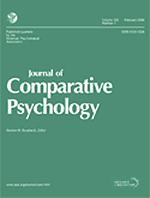
JOURNAL OF COMPARATIVE PSYCHOLOGY
Championing Rigorous Research in Behavioral ScienceJOURNAL OF COMPARATIVE PSYCHOLOGY is a prestigious academic journal published by the American Psychological Association, dedicated to advancing the understanding of behavioral processes across diverse species. With its ISSN 0735-7036 and E-ISSN 1939-2087, the journal has been a cornerstone of comparative psychology research since its inception in 1983. It primarily caters to the fields of ecology, evolution, and behavior, ranking impressively in the Q2 quartile in the category of Ecology, Evolution, Behavior and Systematics, and Q3 in the miscellaneous Psychology category as of 2023. This journal serves as a vital platform for disseminating high-quality research, addressing both fundamental questions and applied issues in systematic studies of behavior across species. Although not open access, its rich repository of research articles, meta-analyses, and reviews makes it an indispensable resource for researchers, practitioners, and students striving to deepen their knowledge and foster innovation in comparative psychological studies. With a commitment to rigorous peer review and scholarly excellence, the JOURNAL OF COMPARATIVE PSYCHOLOGY is a key player in shaping the discourse within its field and driving future research.
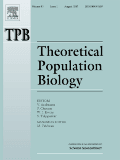
THEORETICAL POPULATION BIOLOGY
Innovating Insights in Evolutionary FrameworksTHEORETICAL POPULATION BIOLOGY is a leading academic journal published by Academic Press Inc. Elsevier Science, dedicated to advancing the understanding of population biology through theoretical frameworks and models. With an ISSN of 0040-5809 and an E-ISSN of 1096-0325, this journal has been a cornerstone in its field since its inception in 1970. Recognized for its significant contributions to the study of ecological and evolutionary dynamics, it currently holds a Q2 ranking in the Ecology, Evolution, Behavior and Systematics category as per the 2023 category quartiles. Researchers and professionals alike appreciate its role in disseminating impactful findings, as reflected in its percentile ranking of the 51st in Scopus for the Agricultural and Biological Sciences field. While the journal is not open access, it remains a vital resource for those looking to deepen their knowledge and research in theoretical approaches to population biology, making it an essential read for students, aspiring scientists, and veteran researchers seeking to engage with cutting-edge theoretical developments.

Adaptive Human Behavior and Physiology
Exploring the Nexus of Mind and BodyAdaptive Human Behavior and Physiology, published by Springer Heidelberg, is a pivotal journal in the fields of behavioral neuroscience, experimental and cognitive psychology, and physiology. With its ISSN 2198-7335, this quarterly journal serves as a forum for innovative research that explores the intricate relationships between human behavior and physiological processes. Although currently categorized within the Q4 and Q3 quartiles for various psychological and physiological domains, this journal has rapidly established itself as a significant resource for cutting-edge studies from 2015 to 2024. The journal’s commitment to high-quality research is reflected in its Scopus rankings, positioning it among noteworthy publications, particularly in experimental psychology and neuroscience. This journal is vital for researchers, professionals, and students seeking to deepen their understanding of adaptive behaviors and the underlying physiological mechanisms. Join the discourse and contribute to this evolving field through your scholarship in Adaptive Human Behavior and Physiology.

Psyecology-Bilingual Journal of Environmental Psychology-Revista Bilingue de Psicologia Ambiental
Empowering Research in Environmental Contexts.Psyecology-Bilingual Journal of Environmental Psychology-Revista Bilingue de Psicologia Ambiental is a distinguished academic publication that specializes in the interdisciplinary study of environmental psychology, bridging the gap between human behavior and environmental contexts. Published by SAGE Publications Inc, this journal offers a platform for researchers and practitioners to disseminate innovative studies, theoretical advancements, and practical applications related to psychological responses to the environment. With a commitment to enhancing understanding in this critical field, the journal has been actively publishing since 2010, providing bilingual content to cater to a diverse audience. The journal currently holds a Q4 ranking in Applied Psychology and Experimental and Cognitive Psychology, and a Q3 ranking in Environmental Science (miscellaneous), reflecting its growing influence and relevance in these domains. Although it operates under a non-open access model, the value of its contributions is recognized in the academic community, making it an essential resource for researchers, professionals, and students alike looking to explore the complexities of human-environment interaction.

EVOLUTIONARY ECOLOGY
Empowering Research in Ecology and Evolution Since 1987EVOLUTIONARY ECOLOGY is a prestigious academic journal published by SPRINGER, exploring the intricate relationships between evolutionary processes and ecological dynamics since its inception in 1987. As a key resource in the field of Ecology, Evolution, Behavior, and Systematics, the journal is recognized for its impactful contributions, holding a commendable Q2 quartile ranking in its category as of 2023. With an emphasis on empirical and theoretical studies that bridge evolutionary biology with ecological principles, EVOLUTIONARY ECOLOGY is essential for researchers, practitioners, and students aiming to deepen their understanding of biodiversity, adaptation, and ecosystem functioning. Although it currently does not offer open access, the journal maintains a commitment to disseminating high-quality research that influences both foundational knowledge and practical applications in the field. Located in the Netherlands, the journal continues to serve a global audience, making significant contributions to advancing ecological and evolutionary research through rigorous scientific discourse and innovation.

Evolutionary Bioinformatics
Exploring the dynamic landscape of evolutionary bioinformatics.Evolutionary Bioinformatics, published by SAGE Publications Ltd, is a pioneering open-access journal established in 2005, dedicated to advancing the field of evolutionary biology through innovative computational techniques and bioinformatics. With an ISSN of 1176-9343, it serves as a critical platform for researchers, professionals, and students to disseminate impactful findings and foster collaboration across disciplines. The journal spans a broad scope, contributing significantly to the areas of Ecology, Evolution, Behavior and Systematics, and Genetics, as evidenced by its respectable Scopus rankings and quartile placements in 2023. With a commitment to providing comprehensive, peer-reviewed research articles and tools for sharing knowledge, Evolutionary Bioinformatics plays an essential role in shaping the future of evolutionary studies and bioinformatics. Readers and contributors alike are encouraged to engage with cutting-edge research that pushes the boundaries of understanding in this dynamic field.
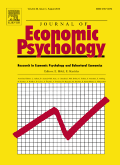
JOURNAL OF ECONOMIC PSYCHOLOGY
Exploring the Mind Behind Economic ChoicesThe Journal of Economic Psychology is a premier academic publication dedicated to advancing the understanding of the interrelations between economic behaviors and psychological processes. Published by Elsevier, this journal has established itself as a critical resource for researchers and practitioners in the fields of *Applied Psychology*, *Economics and Econometrics*, and *Sociology and Political Science*, boasting an impressive *Q1* ranking in each category as of 2023. Since its inception in 1981 and with a commitment extending to 2024, the journal provides a platform for high-quality, peer-reviewed research that influences both theoretical frameworks and practical applications. With a rich interdisciplinary approach, the journal addresses pressing issues at the intersection of economics and psychology, facilitating a deeper understanding of how psychological factors drive economic decisions. Researchers looking to share innovative findings, as well as professionals seeking to implement evidence-based practices, will find the *Journal of Economic Psychology* an invaluable asset in their work. The emphasis on rigorous methodologies and relevant topics makes this journal not just a repository of knowledge, but a beacon for future studies that link economic and psychological insights.

Metode Science Studies Journal
Connecting Ideas Across Time and DisciplinesMetode Science Studies Journal, published by UNIV VALENCIA, BOTANICAL GARDEN UV, is an esteemed open-access journal dedicated to advancing scholarly discourse in the fields of history and philosophy of science and multidisciplinary studies. Since its inception in 2013, the journal has positioned itself as a vital resource for researchers, professionals, and students, fostering an environment for innovative research and cross-disciplinary dialogue. Based in the vibrant city of Valencia, Spain, this journal aims to publish high-quality articles that explore the intricate relationships between scientific practices and philosophical inquiries. With a current impact factor demonstrating its relevance in the academic community, the journal is indexed in Scopus, ranking in the 52nd percentile for history and philosophy of science and the 33rd percentile for multidisciplinary studies. Scholars can access a breadth of research outputs that span from 2015 to 2024, thereby contributing significantly to the intellectual landscape of the respective fields.
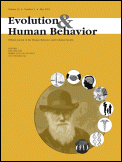
EVOLUTION AND HUMAN BEHAVIOR
Transforming Perspectives on Human Actions Through Evolutionary LensEVOLUTION AND HUMAN BEHAVIOR, published by Elsevier Science Inc, is a leading interdisciplinary journal that explores the intricate relationships between evolutionary processes, human behavior, and cognition. With an impressive impact factor reflecting its rigorous peer-reviewed content and high citation rates, this journal falls in the prestigious Q1 quartile across multiple categories including Arts and Humanities, Ecology, Evolution, Behavior and Systematics, and Experimental and Cognitive Psychology, solidifying its critical role in advancing research in these fields. Since its inception in 1997 and moving towards 2024, it has consistently provided a platform for innovative research and insights, attracting contributions from a diverse range of disciplines. The journal is accessible through various open access options, ensuring that groundbreaking research is widely disseminated for maximum impact. Researchers, professionals, and students alike benefit from the cutting-edge studies published within, making EVOLUTION AND HUMAN BEHAVIOR an essential resource for those looking to deepen their understanding of the evolutionary context of human actions and interactions.
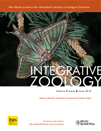
Integrative Zoology
Bridging Theory and Practice in ZoologyIntegrative Zoology is a distinguished journal published by WILEY, focusing on advancing the field of zoological sciences through the integration of various biological disciplines. With both ISSN 1749-4877 and E-ISSN 1749-4869 identifiers, this journal features research that fosters a deeper understanding of animal biology, ecology, and conservation strategies. As a testament to its impact, Integrative Zoology is recognized within the Q1 category of Animal Science and Zoology in 2023, ranking an impressive #27 out of 490 journals in its field, placing it in the 94th percentile among peers. Published in the United Kingdom, this journal not only serves as a critical platform for novel research but also engages a global audience, inviting submissions that bridge theoretical and practical aspects of zoology. While not entirely open access, the journal remains committed to disseminating high-quality research that contributes substantially to scientific advancements. Through its continuous publication since 2008, Integrative Zoology aims to inspire researchers, educators, and students alike, making it a cornerstone for anyone passionate about the complexities of animal life.